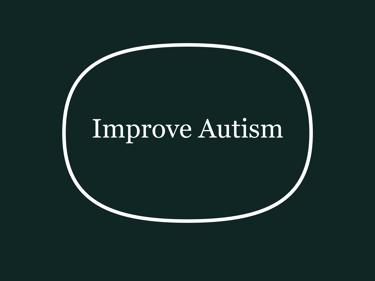Effects of Probiotics on Autism Spectrum Disorder in Children: A Systematic Review and Meta-Analysis of Clinical Trials
Authors:
He, X., Liu, W., Tang, F., Chen, X. and Song, G.
Overall Findings
The study investigated whether probiotics could improve behavioral symptoms in children with ASD by analyzing data from multiple clinical trials. It included seven clinical trials in the meta-analysis, involving a total of 268 children aged 1.5 to 15 years, conducted in China, Italy, and America. The primary focus was on changes in autism-related behavioral symptoms, assessed using various standardized scales such as the Autism Treatment Evaluation Checklist (ATEC) and Aberrant Behavior Checklist (ABC).
Key Findings:
Overall Effect: Probiotics did not show a statistically significant improvement in behavioral symptoms across all studies compared to control groups. The standardized mean difference (SMD) was -0.24, with a 95% confidence interval (CI) of -0.60 to 0.11, and a p-value of 0.18, indicating no significant effect.
Subgroup Analysis: A significant improvement was observed in studies using multiple-strain probiotics (probiotic blends), with an SMD of -0.42 (95% CI: -0.83 to -0.02, p = 0.04), suggesting that blends may be more effective than single strains.
Study Quality: Most trials were of average quality, with only one deemed high quality. Limitations included small sample sizes, variability in probiotics and doses, and short intervention durations.
In summary, while probiotics overall did not significantly alleviate ASD symptoms, multiple-strain probiotics showed potential benefits, though further high-quality research is needed to confirm these findings.
What Probiotics Were Given and How?
The probiotics administered varied across the seven studies included in the meta-analysis. Here’s a breakdown:
Probiotic Formulations:
Single-Strain Probiotics: Used in some trials, e.g., Lactobacillus plantarum PS128 (Liu YW, 2019) and Bifidobacterium infantis (Sanctuary MR, 2019).
Multiple-Strain Probiotics (Blends): Used in others, such as De Simone Formulation (DSF) (Santocchi E, 2020; Arnold LE, 2018; Simmons S, 2022), which includes strains like Lactobacillus plantarum, Bifidobacterium longum, and Lactobacillus acidophilus, and "Bifidobacterium triple live dispersion" (Li YQ, 2021).
Specific strains mentioned include Lactobacillus plantarum, Bifidobacterium infantis, Bifidobacterium longum, and others, but exact compositions differed between studies.
Administration:
Probiotics were delivered as oral supplements, typically in forms like powders or capsules.
Doses: Ranged from 9 × 10^7 to 9 × 10^12 colony-forming units (CFU) per day. For example:
Liu YW (2019): 3 × 10^10 CFU/day of Lactobacillus plantarum PS128.
Santocchi E (2020): 9 × 10^11 CFU/day of DSF.
Simmons S (2022): 4.5 × 10^11 CFU/day of DSF.
Some trials combined probiotics with additional interventions, such as applied behavior analysis (ABA) (Li YQ, 2021), fructo-oligosaccharides (FOS) (Wang Y, 2020), or bovine colostrum product (BCP) (Sanctuary MR, 2019).
Duration: Interventions lasted between 4 weeks and 6 months, with most being 3 months or less.
What Symptoms of Autism Were Improved, If There Were Improvements?
Overall Behavioral Symptoms:
Across all studies, probiotics did not significantly improve behavioral symptoms (SMD = -0.24, p = 0.18).
However, in the subgroup using multiple-strain probiotics, a significant improvement was observed (SMD = -0.42, p = 0.04). This suggests a general reduction in behavioral symptom severity, though specific symptoms weren’t isolated in the meta-analysis.
Specific Symptoms:
The study pooled data using overall behavioral scores from scales like ATEC, ABC, and ADOS-CSS, rather than breaking down improvements into specific domains (e.g., social interaction, communication, repetitive behaviors). Thus, it’s unclear which exact symptoms improved in the multiple-strain subgroup.
Gastrointestinal (GI) Symptoms:
Some individual studies (e.g., Wang Y, 2020) reported improvements in GI symptoms like constipation or diarrhea, but the meta-analysis focused solely on behavioral outcomes and did not pool GI data due to measurement variability.
In essence, while overall results were non-significant, multiple-strain probiotics showed promise in reducing general behavioral symptoms of ASD.
How Long Did It Take Before Symptoms Improved?
Timeframe:
Outcomes were measured at the end of each trial’s intervention period, which ranged from 4 weeks to 6 months. The study does not provide detailed timelines for when improvements began within these periods.
In one study (Wang Y, 2020), significant improvements in ATEC scores were noted after 60 days and 108 days of intervention with probiotics and FOS, but not after 30 days, suggesting that effects may require longer than a month to manifest.
Interpretation:
When improvements occurred, they were observed at the end of the intervention duration. The study suggests that longer interventions (e.g., >3 months) might enhance efficacy, but specific onset times remain unspecified.
Summary
This meta-analysis of seven trials with 268 children found that probiotics overall did not significantly improve behavioral symptoms in ASD (SMD = -0.24, p = 0.18). However, multiple-strain probiotics demonstrated a significant positive effect (SMD = -0.42, p = 0.04), suggesting potential benefits with blends like DSF or Bifidobacterium combinations. Improvements, when observed, were assessed after interventions of 4 weeks to 6 months, with evidence suggesting longer durations (e.g., >60 days) may be more effective. Probiotics are safe and non-invasive, but their efficacy is hampered by inconsistent formulations, small sample sizes, and limited high-quality studies. Further rigorous research is needed to validate these findings and optimize probiotic use in ASD treatment.
https://pubmed.ncbi.nlm.nih.gov/36986145/
doi: 10.3390/nu15061415


